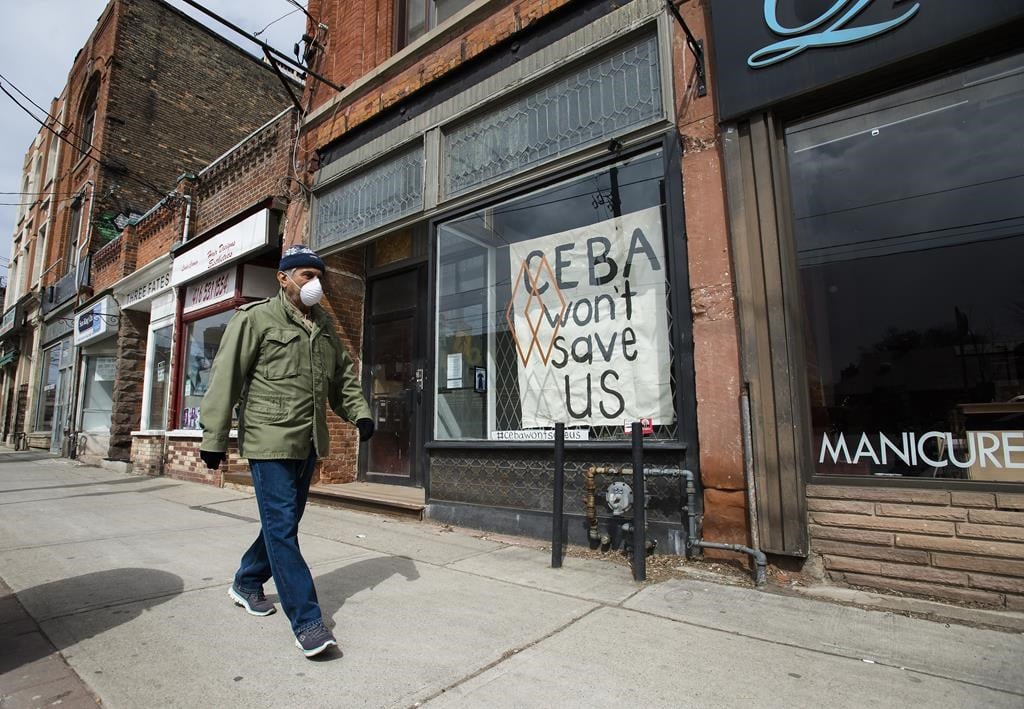Support strong Canadian climate journalism for 2025
Dozens more deaths in long-term care homes were reported Friday as new figures indicated the extent of the economic dislocation caused by isolation measures aimed at mitigating the spread of the highly contagious COVID-19 virus.
The latest government figures showed more than seven million people had applied for the $2,000-a-month Canada Emergency Response Benefit, with the federal government having paid out $22.4 billion — close to the amount budgeted.
The emergency program is but one of several the Liberals have unveiled in recent weeks to cushion the financial fallout from fighting the spread of the new coronavirus, which has been particularly deadly for frail seniors in nursing homes.
The disease has killed 2,300 people across Canada, more than half those in care. Quebec reported 97 more deaths — with a total of 1,340 — with Premier Francois Legault pointing to the dire situation in the province's hard-hit long-term care homes and the more stable situation in the rest of the province.
Ontario reported 57 more deaths at long-term care facilities as it said its overall COVID caseload had grown by five per cent even with a single-day record jump of 640. In all, more than 13,500 cases have been reported in the province, with at least 763 of them fatal.
Prime Minister Justin Trudeau spoke with provincial and territorial premiers Friday and was expected to discuss the "extremely troubling" situation unfolding at understaffed long-term care homes, particularly in Ontario, Quebec and British Columbia.
Calling the situation "unacceptable," Trudeau promised a top-up of wages paid to front-line workers in seniors facilities but said it would be done in consultation with the provinces.
Both Quebec and Ontario have asked the military to help care for residents in nursing homes and Trudeau said the requests had been approved.
"We're identifying what needs to be done and mapping out next steps," Trudeau said. "(But) this is not a long-term solution."
Trudeau said it will be important to take a look at the long-term care situation once the immediate crisis has passed.
At his daily news conference, Trudeau also announced rent relief for businesses that were forced to close because of anti-pandemic measures in mid-March and can't afford to pay their landlords.
Rent for April, May and June will be cut by 75 per cent for those paying under $50,000 a month, Trudeau said. Federal and provincial governments will cover 50 per cent, with landlords picking up the remaining 25 per cent. Non-profits and smaller organizations are also eligible for the help, the prime minister said.
Small- and medium-sized businesses, most of them shuttered due to the pandemic, have been clamouring for relief. The Canadian Federation of Independent Business has said more than half its 30,000 members reported being unable to come up with their May rent.
Calling it one of the worst health and financial crises of our lifetimes, Trudeau said discussions will be ongoing in the coming weeks about getting the economy moving again — as long as it's safe to do so.
"It won't happen overnight," Trudeau said. "It won't be as easy as flipping a switch."
On Friday, with a total of confirmed cases at 118 for a sixth straight day, New Brunswick announced the first of a four-phase reopening plan. Certain low risk contacts were now allowed, such as two family units interacting as part of a "two family bubble," Premier Blaine Higgs said. Limited outdoor activities, such as golf and fishing, were also allowed.
Ontario Premier Doug Ford said his province would outline its plans to reopen the economy next week.
Newfoundland and Labrador reported one full week of no new positive cases of COVID-19 but said employers bringing workers into the province will need a 14-day isolation plan for them.
Deputy Prime Minister Chrystia Freeland said there will have to be some shared standards when it comes to reopening the economy but that could mean different approaches.
"Inevitably, and quite rightly, we will be seeing a different timing, a different pace, of the restart across the country," Freeland said.
A statement from Trudeau's office said the premiers acknowledged the importance of reopening the economy with "a gradual and phased approach" on their Friday call.
South of the border where COVID has killed at least 50,000 people, the state of Georgia allowed barber shops, nail salons, gyms and a few other businesses to reopen on Friday despite the misgivings of health experts.
This report by The Canadian Press was first published April 24, 2020.
— With files from Canadian Press reporters across the country.





Comments